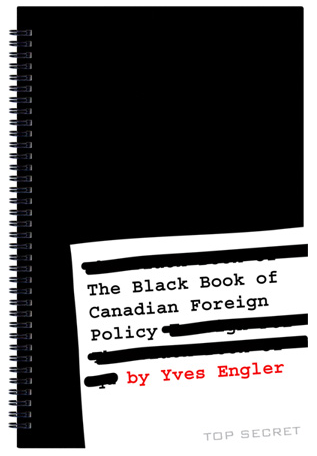STORY about Solidarity posted on November 7, 2010 by dawn
Read With Caution
Engler's Black Book tantalizes and torments
Yves Engler's The Black Book of Canadian Foreign Policy, which came out in 2009, has generated keen interest across the country, and opened up discussions that are long overdue.
"The goal of this book is to reveal a side of international relations that our governments and corporations have kept hidden from the vast majority of us," posits Engler in the introduction. Without further ado, readers are plunged into details of Canada's foreign policy that sprawl across five continents in a country-by-country run down of Canadian wrongdoing.
At times, Engler provides analysis to help us understand the context of the policies or actions he's criticizing. But analysis is secondary to offering up a tantalizing buffet of information about Canadian activity around the world. In the section about the Caribbean, for example, we may appreciate the variety of information Engler gathers to describe Canadian involvement in the banking sector during the early 20th century. The Black Book also describes Canada's role training police in conflict zones like Haiti, Iraq, Iran and Palestine; and exposes Ottawa's corporate diplomacy in favour of Canadian business interests.
No stranger to publishing, Engler previously penned Playing Left Wing: From Rink Rat to Student Radical and co-authored Canada in Haiti: Waging War on the Poor Majority, and has a number of other titles upcoming. There is no doubt that Engler has done a lot of reading. The Black Book's bibliography includes more than 300 texts on Canada's foreign relations, and his chapter notes point to hundreds of articles.
The real contribution of The Black Book is the consolidation of a massive amount of information about Canadian foreign policy. Various factors, however, limit the book's usability, and will likely limit its shelf life.
Beyond the fact that he chose to forego a table of contents and an index, Engler's citation style is not comprehensive. When relying on material he accessed online, Engler provides the web address, omitting the author's name and information about the publication. Quotations from newspapers are cited with reference to the paper by name and date, leaving readers guessing as to the writer. For the reader whose interest is piqued by a particular passage, that means going to the computer and manually entering a URL, a process so tedious that few are likely to follow through. Five, 10, or 50 years down the line, many of the links may be dead or offline.
Non-traditional citations in the book don't stop with URLs as references for web articles. Engler also lists his bibliography in alphabetical order by title (as opposed to by author, as the norm), and leaves out a number of books that he references heavily in the text. These may seem insignificant details, but for readers interested in further research about Canada's foreign policy, the text is missing crucial elements.
And if the book feels like a one-man show, it might be because, in some ways, it is.
Though he enlisted the help of his father with the editing, Engler's writing style obscures the work of a community of people without whom he could not have completed the book. The Black Book includes a list of 21 of the "best books on Canadian Foreign Policy," and includes a page dedicated to The Dominion at the end of the book. Beyond that, Engler does little to acknowledge that his work has been made possible thanks to multiple generations of activists, independent journalists and researchers across Canada, as well as corporate journalists, upon whose work he relies extensively.
Though Engler himself has been involved in direct action and activism aimed to draw attention to the atrocities rubber-stamped by the Canadian government, he hops and skips around resistance to Ottawa's foreign policy within Canada. Engler touches on a 1930s-era movement to boycott Japanese expansionism, protest movements against the war in Vietnam, progressive delegations to the Philippines, 1997 protests against Suharto in Vancouver, anti-apartheid activism, and criticism of Talisman Oil in Sudan.
However, no mention is made of massive mobilizations against the wars in Iraq and Afghanistan since 9/11. No mention is made of decades of solidarity work between Canada and Central America during the Regan era and beyond. No mention is made of Canadians organizing in opposition to the North America Free Trade Agreement or the Canada-Colombia deal. And no mention is made of the Canada Haiti Action Network, nor of other grassroots campaigns against war and Canadian intervention overseas. This lack of consistency with regards to resistance in Canada is indicative, in a nutshell, of the way that The Black Book is written.
By way of example, the book skips from country to country, and often leaves out countries entirely (Honduras, Argentina, North Africa, most of Europe, and Pakistan, to name a few). It also focuses on free trade agreements (FTA) in the Colombia and Peru sections, but neglects to mention that there is an FTA being negotiated between Canada and Central America, or that Canada signed an FTA with Costa Rica in 2002. Without speculating on Engler's motivations, I can only assume that this is because there has been little Canadian journalism produced about FTAs with Central America and Costa Rica compared to Colombia and Peru.
While it would be impossible to fit everything in, it would have been helpful if Engler had explained how he decided what to leave in, and what to skip over. The Black Book is a challenge to read, but it also poses the important challenge to us to learn more about Canadian foreign policy. A second edition could transform what is, for now, a wide ranging but limited overview of Canadian international policy, into a useful tool for students, journalists and activists around the globe.
The site for the Vancouver local of The Media Co-op has been archived and will no longer be updated. Please visit the main Media Co-op website to learn more about the organization.
